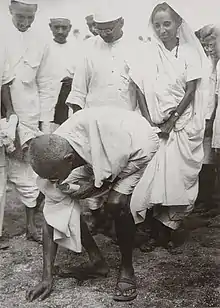1930 in India
Events in the year 1930 in India.
| |||||
| Centuries: |
| ||||
|---|---|---|---|---|---|
| Decades: |
| ||||
| See also: | List of years in India Timeline of Indian history | ||||
Incumbents
- Emperor of India – George V
- Viceroy of India – The Lord Irwin
Events

Gandhi at Dandi, 6 April 1930, at the end of the Salt March
- National income - ₹31,435 million
- 26 January – The Indian National Congress declares January 26 as Independence Day, or the day for Poorna Swaraj (Complete Independence).
- 28 February - Sir C V Raman Received Nobel Prize in Physics.
- 2 March – Mohandas Gandhi informs British viceroy of India that civil disobedience would begin nine days later.
- 12 March – Mohandas Gandhi sets off to a 200-mile protest march towards the sea with 78 followers to protest the British monopoly on salt – more will join them during the Salt March that ends on 5 April.
- 6 April – In an act of civil disobedience, Mahatma Gandhi breaks British law after marching to the sea and taking salt.
- 18 April – Chittagong armoury raid also known as Chittagong uprising.
- 30 April – The Vedaranyam Salt satyagraha led by Rajaji and Sardar Vedarathinam Pillai culminates in South India
- 4–5 May – Mohandas Gandhi is arrested again.
- October – First Round Table Conference opens in London.[1]
- 28 December – Mohandas Gandhi leaves for Britain for negotiations
Law
- Publication of the report of the Simon Commission.[2]
- Sale of Goods Act
- Hindu Gains of Learning Act
Births
- 3 June – George Fernandes, politician (died 2019)[3]
- 6 June – Sunil Dutt, actor, producer, director and politician (died 2005).
- 7 June – Chitrananda Abeysekera, Sri Lankan veteran broadcaster (died 1992)
- 10 June – Satya Priya Mahathero, Bangladeshi Buddhist pundit, religious leader and social worker (died 2019)
- 26 June – Mehli Irani, cricketer (died 2021)
- 30 June – Nabeesa Ummal, politician (died 2023)
- 9 July – Kailasam Balachander, Producer, Director, Actor (died 2014).
- 11 July – Shafiqur Rahman Barq, politician
- 10 August – R. Nagaswamy, historian and archaeologist (died 2022).
- 5 November – Arjun Singh, politician and Minister (died 2011).
- 18 November – Jai Narain Prasad Nishad, politician (died 2018)[4]
- 23 November – Geeta Dutt, playback singer (died 1972).
Full date unknown
- Bahadoor, actor (died 2000).
- Geeta Bali, actress (died 1965).
Deaths
- 12 May Kaikhusrau Jahan, Begum of Bhopal (born 1858)
- 16 September – Martial Paillot, French Roman Catholic missionary, history professor and parish priest
- 28 September – T K Madhavan, the architect of Vaikam Sayagraham and organizing secretary of SNDP Yogam.
References
- Everyman's Dictionary of Dates; 6th ed. J. M. Dent, 1971; p. 263
- Everyman's Dictionary of Dates; 6th ed. J. M. Dent, 1971; p. 263
- United States. Congress. House. Committee on International Relations. Subcommittee on International Organizations (1976). Human Rights in India: Hearings Before the Subcommittee on International Organizations of the Committee on International Relations. U.S. Government Printing Office. p. 118.
- India. Parliament. Lok Sabha (2000). Who's who. Parliament Secretariat. p. 647.
This article is issued from Wikipedia. The text is licensed under Creative Commons - Attribution - Sharealike. Additional terms may apply for the media files.
